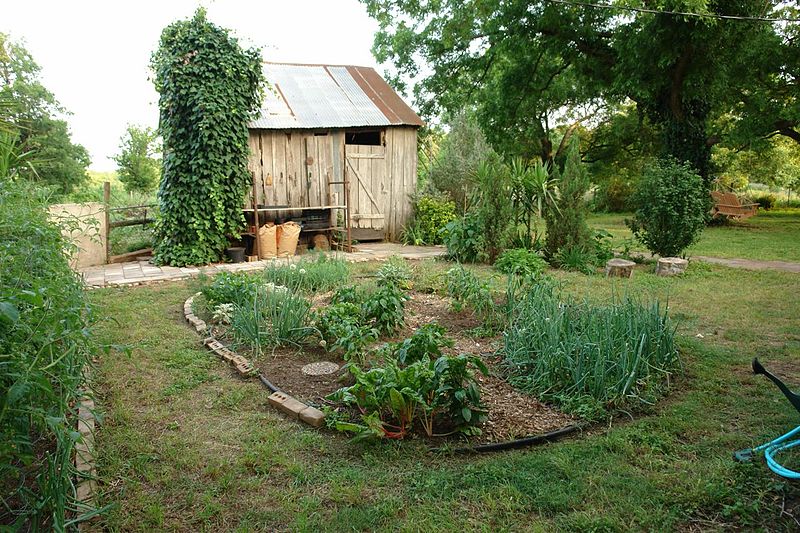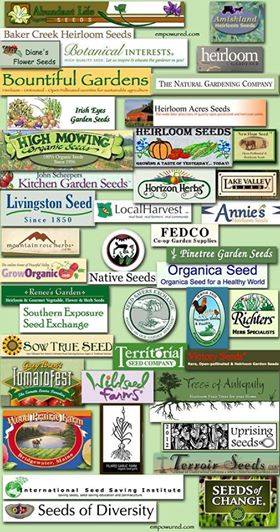Table of Contents[Hide][Show]

Seed catalogs for the upcoming growing season are arriving in mailboxes across the Northern Hemisphere with home growers everywhere starting to plan which seeds they will sow in freshly composted garden. A positive trend in recent years is the growing number of gardening enthusiasts choosing to plant gardens using organic and/or heirloom seeds.
What most of these home gardeners don’t realize is that corporate behemoth and GMO titan Monsanto has been gobbling up the seed market faster than a caterpillar can munch a tomato plant! With one fell swoop in 2005, Monsanto grabbed approximately 40% of the US vegetable seed market with its acquisition of Seminis.
This means that a home gardener could unknowingly be supporting the development and proliferation of genetically modified crops if the seeds used are from Seminis. In addition, Monsanto now apparently owns the trademark for many of the names of the heirloom seed varieties themselves!
Planting a sustainable home garden is much more than just choosing certified organic seeds and seedlings, eschewing pesticides/herbicides and using organic compost. This is because Monsanto has cleverly positioned itself to make money off the home gardening trend.
Does this mean that even if you buy organic or heirloom seeds from a completely independent company some of your purchase might be supporting the bad guys?
Yes, it does.
Surprise!
Home gardeners would do well to bone up on where to purchase their seeds so they aren’t inadvertently doing business with companies that maintain a working relationship with Monsanto-Seminis or were acquired by them.
Buying Organic or Heirloom Seeds Without Supporting Monsanto
Here are the recommended steps for the 2014 growing season for those who want to truly strike a blow for sustainability in every way with their home gardens:

Avoid buying from the seed companies affiliated with Monsanto. Here’s a list of these seed companies by location (enter you zipcode for a list of dealers to avoid).
- Buy from companies Monsanto HASN’T bought and are not affiliated or do business with Seminis: The graphic above indicates numerous companies that are worthy of your patronage as compiled by the International Seed Saving Institute. Please note that this many not be a complete list. If your seed company does not appear, just be sure to clarify with the owner about any potential affiliation with Monsanto-Seminis before buying from them.
- Avoid buying heirloom varieties for which Monsanto owns the trademark.
- Ask seed companies if they have taken the Safe Seed Pledge. Here’s a list of companies that have taken the Safe Seed Pledge and believe in responsible plant genetics. These are good companies to buy from.
Background on Monsanto’s Quest for World Seed Domination
Monsanto’s corporate quest is clearly to make money on each and every one of us whether we choose to eat supermarket frankenfoods produced with abominable, patented GM crops or carefully plant and tend an organic garden at home. Here’s some background information on the subject you may find interesting as well as enlightening:
If you are a home gardener and have information to contribute regarding these steps, please add to the discussion in the comments section. Also, please spread the word via gardening forums you may participate in that folks need to be very careful when seed sourcing for their spring gardens this year else they might be unknowingly supporting Monsanto.
Let’s make this the year when Monsanto’s grip on the worldwide seed market loosens and the movement to seed sustainability gains momentum!
Update
The day after this article was originally published in 2013, the CEO of a large GMO soybean seed company in the Midwest emailed me complaining that the article was short-sighted and insisting that Monsanto is helping feed the starving people of the world. He even went so far as to say that GMO crops are “proven safe”. Click here for the text of this CEO’s entire email plus my written reply.
I have also received email complaints from two other seed companies, one in Canada and one in Arkansas, that do business with Monsanto-Seminis and were offended by what they viewed as inaccuracies in the post. In response, I have adjusted the text slightly and moved linked sources to within the text rather than only listed at the end to make the message of the post as clear and precise as possible so as to not result in any consumer confusion over the information.
I have received no complaints about this article from seed companies completely independent of any affiliation or ties to Monsanto-Seminis.
More Information
Why I Avoid Organic Hydroponic Produce
The Hydroponic Invasion of USDA Organic
Heirloom vs Hybrid Produce
Photography Credit








It must be nice to be able to have principles and live the life one wants. When you live below poverty level, and can only afford the cheapest foods, GMO’s come along with the program. And buying seeds is out of the budget as is the cost of creating a garden, then paying the water bills to keep it all alive in hot zone 10. I wish I could live a perfect organic life. But it isn’t possible right now….and may never be.
Christy, I find myself wondering a couple of things….1) Why are you on this site if you don’t have a garden, 2) what, exactly is the point of your post??
Frankly, after reading your little note the word that pops into my mind is……Troll…..
Christy, I can tell you from experience that just because you live below poverty level doesn’t mean you cannot grow your own food. And don’t let anyone as judgmental as the other person who comment to your post discourage you from seeking advice or help. All it takes to at least give growing your own food a try is a little bit of dirt. Anyone can make compost to amend their soil, which means less watering is needed. Seek out farmer’s markets in your area, THAT is generally the cheapest food you can spend your dollars on. Check your area for local growers, perhaps you can make friends with someone who already grows their own. Obviously you have access to the internet, so do some Google searches on frugal gardening. There are ALWAYS ways to cut back in other areas to get what you want. Our local farmer’s market even accepts food stamps. You ALWAYS have better options available to you. You just have to figure out where they are and get creative.
Heather, your passive-aggressive approach is really annoying. If you have a problem with something I said, say so. I am a big girl and can handle it.
Now, please show me where I was being judgemental of Christy? I asked two legitimate questions. Neither of which she answered. That is not judgemental. Had I posted “you have no right to be here or to comment because you don’t have a garden” THAT would have been judgemental. No, I asked her two questions and made an observation that her post, having no apparent point to it other than “oh, poor me….I can’t afford to grow my own food (which is baloney, as you point out) and all you people who actually have money should feel sorry for me” to me screams “troll.” Apparently you don’t know what a troll is. Typically they post meaningless, pointless statements designed to get people riled up.
Christy, I live at poverty level and have 8 raised beds that allow me to grow about half my years vegetable supply (and overwinter kale, chard, etc). I used free pallets (untreated woods to create my first beds, and some manure from local horses to help build my soil. I bought a barrel from habitat for humanity and made a composter (had to keep animals out)
I spend about $30 a year on seeds and people give me leftover seeds that they have. I grow alot of garlic which is pretty remarkable because two big heads creates alot of garlic.
The best thing is to start small..maybe just with garlic, or lettuce and one raised bed.
Hope this helps you start. Peace and love, Robin
I have personally used many seed companies from Canada (as I am Canadian) and was upset to see some of their names on this list. After further research, I see a lot of the information in this post is not true and that gets me angry. I’m going to continue to support these seed companies in Canada. As a consumer, it’s very important to research information before you make a decision. Often it is one-sided. I support the Weston A. Price Foundation but find many of the posts on this blog are not completely accurate. What bothers me is that when others refute what is written or challenge it, they often do not get a response (from Sarah). This lack of response does NOT lend credence to the blog post. If you can’t defend what you say, then you should not be posting it. Silence, in this case, is not golden, it’s rather cowardly. I’m all for health but not for the high-horse attitude one gets on when one thinks they are on the right path (I notice this in the raw/vegan food movement as well as in many religions). It’s really very bully-like and limits credibility. Please think carefully before you damage someone’s livelihood. And, if you are going to post information that will get someone’s dander up – then be prepared for an argument. If you don’t know how to argue, then maybe you shouldn’t be running a blog that often challenges the way people live, because not everyone agrees with you, and sometimes, you just may be wrong. Be big enough to admit it when you are.
Heather, there is no way to correct the errors if you don’t point them out. Which Canadian seed companies are incorrectly noted to be selling either GMO seeds or seeds owned by Monsanto (not all Monsanto seeds are GMO).
Buena,
Thanks for the update on Virmiculite. I loved starting my seeds (sq ft garden) in virmiculite. I am looking forward to using that again this spring.
Thanks,
Robert